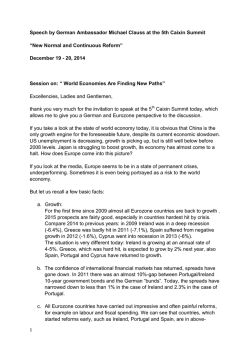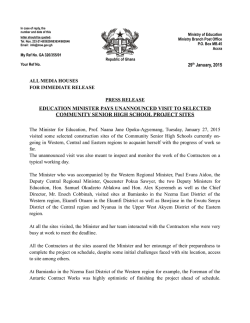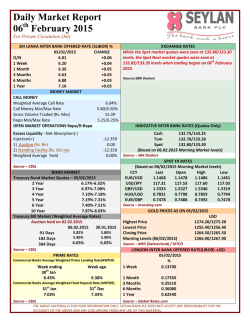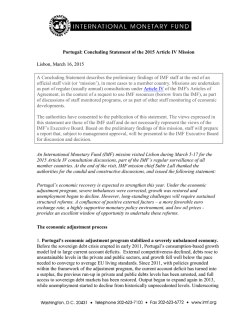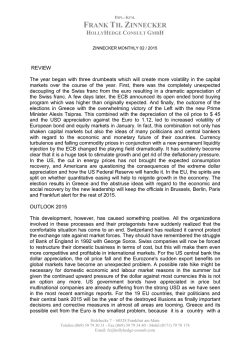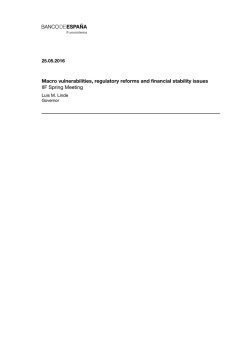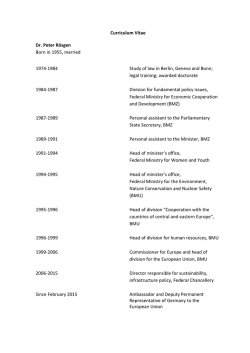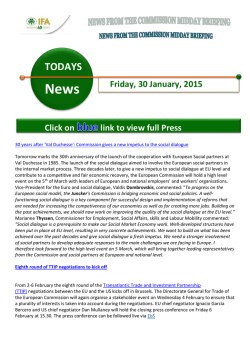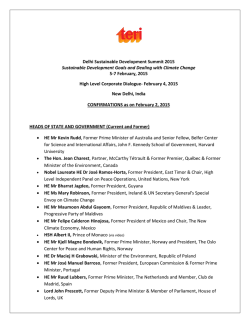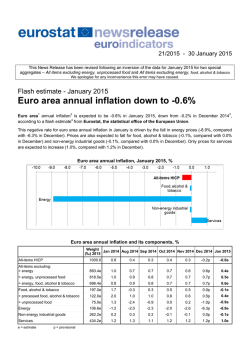
Download PDF
Official speeches and statements of january 28, 2015 1 - Spain - Air accident - Communiqué issued by the Presidency of the Republic The French President was deeply shocked to learn of the death of eight air force personnel after an F-16 fighter plane crashed shortly after take-off from the Albacete base in Spain, during a NATO air exercise. The accident also caused serious burns to six mechanics, according to the casualty figures provided by the Spanish authorities. He expresses his profound respect for the commitment of these personnel - officers and NCOs - who were preparing for operational air force missions. He recalls that every day, French air force personnel engaged in the Sahel and over Iraq are bravely and efficiently carrying out missions to combat terrorist groups and consolidate our security. The Head of State extends his very sincere condolences to the victims' families, friends and colleagues and assures them of the nation's full solidarity in these painful circumstances. The Defence Minister will visit the scene of the tragedy in Spain as soon as possible./. (fin de l'article) Page 1 2 - Fight against terrorism - Climate disruption - Economic issues - Speech by M. François Hollande, President of the Republic, at the Davos World Economic Forum - excerpts (...) ROLE OF BIG BUSINESSES IN COMBATING TERRORISM/TAX HAVENS/MONEY LAUNDERING Here in Davos, by speaking about the economy, by speaking about growth, by speaking about innovation, by talking about confidence, you must also promote security, stability and solidarity. It's a joint responsibility. So I call on you (...) major economic players, heads of the world's biggest corporations - I call on you not just to be vigilant, but to commit. In particular, I'm calling on the big digital companies to do their bit, identify illegal content, make it inaccessible and ensure a kind of rule is established, because you are also directly involved in regulation. I'm appealing to the financial system to cut off sources fuelling terrorism, put an end to tax havens and combat money laundering. This is in our shared interest. Don't let a monster be created which, in time, will attack you too. More broadly, I'm calling on all businesses to support the most vulnerable states' economic and social development. PARIS CLIMATE CONFERENCE/»PARIS CLIMATE ALLIANCE»/GREEN ECONOMY INVESTMENT For the sake of solidarity, and for the sake of security too, I also call on you to ward off another threat, one hanging over the very future of our planet. Without further delay we must combat global warming. Mr Chairman, you said that France was going to be putting on the Climate Conference at the end of the year. But we aren't just putting on a conference! We aren't just hosting many heads of state and government and thousands of participants! We aren't just making declarations of principle! We aren't just assessing the situation! We aren't just arranging meetings for ourselves! At the Paris Climate Conference, there has to be an agreement, a comprehensive, binding agreement which enables us to begin a genuine battle against global warming. This is the great challenge of the 21st century. Indeed, gone are the days when man could casually, selfishly help himself to resources which were deemed inexhaustible. As we now know, the earth is not a commodity or an inexhaustible resource. It's a heritage, a heritage we share. (...) France, in the framework of the conference presidency, wants businesses to play a major role. There will be several meetings and you will be invited to them. We want businesses to make a commitment, invest, innovate and prepare with us, with the states, with the non-governmental organizations, with societies - tomorrow's economy. The world's Page 2 driving forces must act to make the Paris agreement a success and get the process going to fight global warming. This is what I call the Paris climate alliance, and I've come here to Davos to invite you to take part in this alliance. Capital must be invested on a huge scale in the green economy. Today, fewer than 1% of traditional portfolios are allocated to the green economy. So we've got to create a new market, a financial products market, bond markets green bonds worldwide, i.e. wherever there can be, on the one hand, capital ready to be invested and, on the other, opportunities to create a new economy. We shall achieve this only if, here too, signals are sent to the market and there's thus a predictable price for carbon. This is an essential requirement, so that businesses can plan their investment safely over time. What we're most suffering from in this period, the one we're going through, is volatility, instability, uncertainty about commodity prices and also [uncertainty] about the geopolitical situation around the world. And when there's uncertainty, when there's instability, when there's insecurity, there's no investment. (...) People will say to me, «but the drop in oil prices may stop people acknowledging that fossil fuels are gradually going to disappear in the energy balance». I believe exactly the opposite: (...) the fall in oil prices creates an opportunity to prepare and invest because, precisely, we can use the margin we've been given to make the investment which is essential for the energy transition. FRANCE/INTERNATIONAL POSITION/TECHNOLOGY/INDUSTRY (...) I've also come to Davos to tell you that the French economy is preparing not to face the world - it has long been prepared for this - but to take a good look at the conditions which will enable France to maintain its international position on the technological and industrial fronts. We're faced with the obvious fact that growth today is too weak, even though it isn't at the same level worldwide, and unemployment is too high - especially in the Euro Area. EUROPE/GEOPOLITICAL SITUATION/URKAINE We're well aware that doubts linked particularly to Europe and the geopolitical tensions are weakening growth potential today. I mentioned the Middle East; I'm also thinking about Ukraine, because this has created not just concern at humanitarian level with deaths on Europe's borders every day, but also a major risk of instability and sanctions on top of embargos, the embargos themselves creating trade difficulties beyond Ukraine itself. And then there's financial instability. So the world also has to act; the G20 has taken sound steps, particularly by urging stronger growth, greater coordination between economic policies, better regulated financial flows, a more effective battle against tax Page 3 avoidance, tax havens and tax optimization. I personally want to salute these efforts - these results, even - because they prove that the world is able to regulate itself. I can see the shortcomings: there are still too many grey areas in the financial world, there are still capital flows which aren't necessarily well regulated; there are still countries which have taken steps, in derogation of international tax law, to attract a certain amount of investment - which, incidentally, distorts competition. But I can see all the progress made too. The greatest risk at global level is inequality: inequality between countries, with the frustration, anger and impatience it can cause, and inequality within each of our countries, with all the risks of tension it can entail. And so there again, the world must remember that it has its responsibility and that the fight against inequality can also be a factor for growth. How can we achieve results? Through education, through training, through qualification, and that's why I call again here for major investments - digital technology can help - to be made in education everywhere, in all our countries, particularly the most vulnerable ones. REFORMS/INVESTMENT Decisions by the European Central Bank among others mustn't, however, lead us to delay reforms, at any rate the ones we've embarked on in France. On the contrary, I believe these decisions taken by the European Central Bank oblige us to be bolder in removing obstacles to growth and job creation. France will adopt a three-pronged approach: more competitiveness first of all, with the implementation of the Responsibility Pact which I presented a year ago and which has now come into force. It amounts to euro40 billion in reduced contributions and taxes for businesses, it also means introducing ways of significantly simplifying how the economy operates, and finally it means giving visibility to stakeholders and investors. Concurrently, vocational training has been reformed in France, particularly to enable the funds devoted to it to be more geared towards unemployed people. There's also been a reform of the labour maket, which has also enabled us to adapt our economy to reality while safeguarding employees. We've encouraged apprenticeships, and today we're engaged in a new reform being debated in Parliament, with greater flexibility for labour, with a reduction in litigation periods for conflicts on the labour market and with several major economic sectors being opened up to competition. Because France is conscious of its strengths - you're aware of them, I won't list them here, it would take too long but it's also conscious of its limits and its handicaps. So we'll act, and we'll act in particular to be and remain a great innovative country. France has advanced technology and a training system enabling us to supply the entire world with many skills. Innovation is the key to everything. We've introduced a tax mechanism in France, the R&D tax credit, which is no doubt the most powerful in the world for attracting investment in research and development. We've chosen to give priority to three major industrial sectors related to the energy transition, the bioeconomy and the digital sector. And we've maintained all the industrial plans that could tie in with those goals, because for us they're the future of the global economy. We're reaping the first results. This year France was ranked the world's leading nation for start-ups. We have start-ups which are growing very fast - the largest number in the world -, but we're aware that we must make an effort to Page 4 attract investment and export: the two go hand in hand. We must be more attractive and export more, which means being more productive. Already, 20,000 foreign companies are established in France; two million of my compatriots work for those companies, and in recent months we've sought to improve the tax regime for people rightly known as «impatriates», who come to work in France. Commitments have been made to ensure the safety of investments made in France, and I also pay tribute here to all the people who have chosen to invest in France, who have confidence in France. But France owes them clarity in its decisions and stability in its choices. That's why we're ensuring there's no retroactive taxation. And we've introduced mechanisms called advance tax rulings, which guarantee the level of contributions each investor will be asked to make. We've created an agency, Business France - it's not sufficient for attracting people, but it's a requirement -, to attract even more investment to our country. And that agency is available to all entrepreneurs who would like to locate their activities in France. At the same time as allowing foreign investment to come to France, we're investing abroad on a large scale, because we want to become a great exporting nation again, and so we must gear many more of our businesses to global markets. TERRORISM/RELIGION As I was saying, you expect a great deal of France, and you're right - so that it takes the necessary decisions on security and is also involved in risk prevention, in combating threats. You've been watching France in recent days. You've seen it come together; you've seen the people proud to uphold their values; you've no doubt been struck by the dignity of all those demonstrators who said, quite simply, that they weren't afraid, that they had confidence in their country, that they were proud to be what they are, in all their diversity. As you've seen, every religion has its place in France and we can't accept anti-Semitic acts taking place in France because we are France - or Jews being killed because they are Jews. As you've also seen, we can't accept anti-Muslim acts taking place, and we've taken every measure to ensure all our compatriots can be protected. As you've seen, there's been mobilization focused on schools, because they are the sacred place where learning, knowledge and common rules must be passed on. (...)./. (fin de l'article) Page 5 3 - Greece - Euro Area - Interview given by M. Michel Sapin, Minister of Finance and Public Accounts, to the daily newspaper Libération Q. - What's your analysis of Syriza's success? THE MINISTER - The party is clearly in tune with a people who are suffering. The Greeks have made huge efforts, whether voluntary or imposed: pensions and salaries have been massively reduced, taxes - when they're paid - have increased considerably and the civil service has been heavily cut back. It's clear that a country that has lost a quarter of its wealth in five years is a country that is suffering. Q. - Aren't the Greeks also disappointed at getting nothing in return, insofar as the traditional parties haven't managed to reform a mercenary, inefficient, corrupt state? THE MINISTER - A transparent, uncorrupted state where everyone pays their taxes is clearly what the majority of the Greek people want. When Syriza says, in unison with the Euro Area and the International Monetary Fund, that a fair taxation system is needed where everyone pays taxes, this reflects the feelings of some Greeks, who believe they've paid their due where others wouldn't. The previous governments can't really be said to have resolved this issue. (...) Q. - What can the Euro Area do to help Greece ease the debt burden and austerity policies? THE MINISTER - With or without a Syriza victory, the issue of the debt is on the table. We agreed at the end of 2012 that we'd talk about it when Greece had made progress on its reforms and had a primary budget surplus - i.e. not taking interest [payments] on the debt into account. We're there: expenditure has been balanced by income since 2013. The Greeks have made a gigantic effort, much greater than we have, and therefore you can't talk about austerity in France. For all that, there's no question of agreeing to the Greek budget being knocked off balance again and re-entering a deficit spiral. In any case, to fund such a policy the government would have to finance itself on the markets or from donors, and I don't think anyone would be ready to lend it money unconditionally. Q. - In practical terms, what can we do? THE MINISTER - There are a whole series of possible technical details to discuss. But I stress we'll do so while taking into account what reform commitments Greece makes. The most painful thing, rebalancing the budget, has already been accomplished, but the easiest thing to do on paper - the reform of the Greek state, structural reforms - is still largely on hold. A modern, efficient state must be built, as well as an independent fiscal administration capable of bringing in taxes, without anyone enjoying special treatment. These are reforms that aren't easy to carry out, but they're part of Syriza's programme and we could insist on them. Page 6 Q. - Will this language be listened to, particularly in Germany? THE MINISTER - Gaffes have been made, it's true, particularly in Germany. While the official statements have always been civil, this hasn't been true of anonymous quotes, which haven't contributed to moderate language on Greece or a calm debate in that country. The fact remains that the German government, like the others, has already started thinking about what happens next. Today Greece's debt represents 177% of GDP - GDP which has declined by a quarter since 2008. If its GDP were at the same level as in 2008, the level of the debt would be only 125%... In other words, the lack of growth is central to the issue. So Greece, which is only just returning to growth, must be helped. Q. - Are you ruling out a «Grexit»? THE MINISTER - Absolutely. Nobody wants an exit from the Euro Area, either in Greece or in the other Euro Area countries. Q. - By deciding on a massive debt purchase programme, isn't the ECB saying the Euro Area is facing an intolerable level of debt? THE MINISTER - It's signalling that when the inflation rate equals zero or is even negative, the debt burden is a problem for everyone./. (fin de l'article) Page 7
© Copyright 2026
